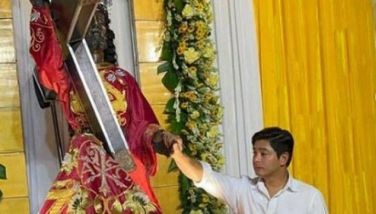There is hope… maybe!
We were heading back from Sagip Kapamilya relief operations in Sto. Tomas, Pampanga when I heard about PNoy’s statement on the abolishment of the pork barrel.
From that point on, I knew the public’s attention would be focused on that. I was just grateful that in the past few days that Habagat was the banner story in the news, Filipinos were responding to calls for donations.
Being out on relief the past weeks, I was not aware that a clamor to scrap the pork barrel was building up in social media, and I certainly did not anticipate the turnout of hundreds of thousands of supporters.
People want change. Filipinos want to get rid of corruption!
For as long as I’ve lived, I’ve heard stories about corrupt politicians from my Papa Nick who’s such a fan of AM radio. Like many Filipinos, he was ecstatic about the 1986 People Power revolution only to be left frustrated by the presidential appointees of President Cory.
I have always been the gullible and idealistic one, always challenging that bit of possibility that my Papa may be wrong about his perception of people in politics, and dynasties, down to the kotong cops.
But as the saying goes, “What you don’t know won’t hurt you.†My work in media got me enlightened and feeling damned about the corrupt system. I did investigative work in Probe, and learned from experience that exposés don’t always warrant the attention of government. Other journalists have been killed in the pursuit of truth, and more often, they die in vain.
Compared to exposing corruption, my work now in public service brings instant fulfillment. You have less enemies and it brings hope to many Filipinos in need.
On the political front you could say, “I’ve given up. I didn’t expect to see hope in changing the corrupt system of politics.†But I would be just too happy to be proven wrong. And to hear the old-timers like Teddy Boy Locsin and Prof. Randy David optimistic about the involvement of the new generation of civil society, the social media, left me thinking. Maybe there is hope.
For the cynics, I know it’s too soon to celebrate, as we anticipate what will happen with Janet Napoles and the officials who are allegedly involved. What happens next is the big question.
The ball is in the court of the Department of Justice, but we are all watching closely.
Many times in our history, we have seen how the civil society has managed to engage government, but it is the majority, the less fortunate have the power to elect our leaders.
Where are the less fortunate amidst the clamor to rid corruption?
Majority of our disadvantaged kababayan are preoccupied with making ends meet. They have to fend for their children and their families first before they even engage in national issues.
Or in the case of calamity victims, they are stuck in evacuation centers, still figuring out where to get the money to build their homes, and how to earn a living.
Hence, it was in bad taste when a female legislator said that they are OK to scrap pork barrel as long as their constituents will not ask help from them.
Spending time with the disadvantaged will be an enlightening experience not only for our leaders but for all of us. It is true what Manila Archbishop Cardinal Tagle said, and what Pope Francis said, spend time with the poor.
Like many reading this paper, my early exposure to poverty is the urban poor, the sampaguita vendors, those begging for help, the informal settlers. The hazardous streets are where many of our poor have found their employment.
If the poor in Manila have at least something to eat, the situation in the provinces is far worse. Some do not even have rice to eat, but corn. Their ulam is salt. Even if education is free, they do not have any means to go to school.
Seeing this level of poverty, I cannot blame them if they would ask help from anyone who could help them during desperate times.
The essence of the Philippine Development Assistance Fund (PDAF) was good because it allows government to reach out to Filipinos all over the country. But unfortunately, it has become a political tool of the president over the legislature, and the legislators to its constituents.
The painful reality is, instead of basic services being institutionalized, the poor has to beg politicians for help and feel indebted for something that is theirs to begin with.
While writing this column, I asked our Lingkod Kapamilya team what have they learned from the poor. Elmer, one of our case workers told me not to call them “poor.†I couldn’t quite understand.
Another case worker, Dyan told me that it’s politically incorrect. They are already poor to begin with, so we should not rub it in.
Our team leader, Jodink Sayong, told me a story that when someone would approach him crying, and asking for help, he would tell that person to stop crying. He wanted to restore their sense of dignity.
The problem is not the PDAF, but our politicians who find fulfillment acting like padrinos and lords using tax payers’ money.
The problem is not the less-fortunate asking for dole-outs, but the lack of institutions that they can approach for help.
Once and for all, we should bring back the honor in public office, and restore the dignity of those who have less.
(Do e-mail me at [email protected].)
- Latest
- Trending

































